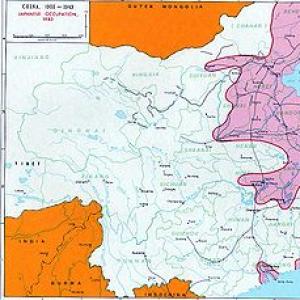Perm region-Volga federal district. Education in the Perm region for people with disabilities and disabilities How many disabled people are there in the Perm region
Today in the Perm region 231.9 thousand disabled people receive social support measures. In the region, about 34 thousand people are recipients of disability insurance pensions, which is 4.4% of the total number of insurance pension recipients. The size of their pensions was indexed by 4% from February 1, 2016, and the average in the region amounted to 8,460 rubles.
The size of such a pension depends on the age of the disabled person, length of work experience, average earnings, and the amount of insurance contributions for compulsory pension insurance. A fixed payment is established for the insurance pension for disabled people, which depends on the disability group, the presence of dependents and the place of residence of the disabled person.
In addition to disability insurance pensions, the legislation provides for the establishment of state pensions - social pensions. Today, the size of the social pension is: for disabled children and disabled children of group I - 13,689.04 rubles; disabled people from childhood, group II - 11,407.69 rubles; disabled people of group I - 11,407.69 rubles; disabled people of group II - 5703.83 rubles; disabled people of group III - 4848.26 rubles.
Pension legislation grants certain categories of citizens the right to simultaneously receive two pensions. This category includes disabled people due to war trauma, disabled people and participants in the Great Patriotic War.
In accordance with the decrees of the President of the Russian Federation, the following has been established: compensation payment for caring for disabled citizens (disabled people of group 1) in the amount of 1380 rubles, and for parents or guardians (trustees) caring for disabled children aged 18 years and for disabled people of group I since childhood , monthly payment - 6325 rubles (taking into account the regional coefficient of 1.15).
In addition, non-working disabled people whose income does not reach the subsistence level (in 2016 - 8,175 rubles) are provided with a federal social supplement.
Along with pensions, the Pension Fund of the Russian Federation assigns and pays monthly cash payments (MCB) to disabled people, the amount of which depends on the disability group. Currently, 231,925 people with disabilities have been provided with EDV. From February 1, 2016, the EDV was increased by 7%. Today, the following amounts of EDV are provided: disabled people of group 1 - 3357 rubles, groups 2 - 2397 rubles, groups 3 - 1919 rubles, disabled children - 2397 rubles.
Also in February, the cost of a set of social services was indexed by 7% and now it is 995.23 rubles.
The Russian Pension Fund and its regional branches pay increased attention to their clients who, due to certain circumstances, have become disabled. All are created the necessary conditions to facilitate their access to pension services.
Sent a response about education for children with disabilities in the region.
We thank the Ministry staff for the information provided!
Below is the text of the response. You can see information on education for people with disabilities in other regions.
Providing children with disabilities (hereinafter referred to as HHI) and disabled children with adequate conditions to receive quality education, development and self-realization is one of the main directions of development of the education system of the Perm region.
The tasks of creating conditions for the education of children with disabilities and children with disabilities are reflected in state program of the Perm region “Development of education and science”, approved by Decree of the Government of the Perm Territory of October 3, 2013 No. 1318-p.
Depending on the specifics of the special educational needs of children with disabilities, disabled children in educational institutions In the Perm region, adapted basic general education programs of various types are being implemented for children of the following categories: deaf, hard of hearing, late deaf, blind, visually impaired, with severe speech impairments, with musculoskeletal disorders, with delay mental development, With mental retardation, with autism spectrum disorders, including special individual development programs for students with severe (multiple) developmental disorders.
In accordance with Part 3 of Article 5 of the Federal Law “On Education in Russian Federation» dated December 29, 2012 No. 273-FZ for disabled children, people with disabilities in the Perm region, like other citizens, universal access and free education are guaranteed in accordance with the federal state educational standards of preschool, primary general, basic general and secondary general education, secondary vocational education, as well as on a competitive basis free of charge higher education, if the citizen receives education at this level for the first time.
Education for preschool children
Educational service for children with disabilities and disabled children preschool age organized in 1 specialized preschool educational institution, 3 structural divisions for preschoolers with disabilities in special general education schools and in 285 compensatory groups.
According to the regional portal, as of September 1, 2016, 4,790 children with disabilities receive preschool education services, including 1,077 disabled children and 549 people. receive an allowance for receiving educational services at home.
In accordance with the Decree of the Government of the Perm Territory of August 27, 2010 No. 560-p “On approval of the Procedure for raising and educating disabled children of preschool age at home according to the basic general educational programs of preschool education and the Procedure for providing compensation for part of the costs to parents (legal representatives) for education and teaching disabled children of preschool age at home according to the basic general educational programs of preschool education,” families of disabled children who do not attend kindergarten are provided with compensation. The amount of compensation is 20,781 rubles.
School education
According to data for the 2016-2017 school year, 18,963 children with disabilities are studying in the school education system of the Perm Territory. Of these, 8141 (43%) study in general educational organizations 10,822 (57%) working in adapted basic general education programs are in the general education system, including 4,598 in special (correctional) classes and 6,224 in “regular” classes.
The number of disabled children in the school system is 4,758 (including 1,902 in general education classes).
Education of disabled children and children with disabilities is carried out, in total, in more than 500 secondary schools in the region.
In organizations additional education There are 4,094 children with disabilities and 1,212 disabled children. Children with disabilities are engaged in the following areas of additional education programs:
- technical creativity (345 people);
- sports and technical creativity (48 people);
- environmental and biological direction (345 people);
- tourism and local history (175 people);
- sports direction (1121 people);
- artistic creativity (2767 people);
- cultural studies direction (132 people);
- others (373 people).
Professional education
Vocational training for persons with disabilities is carried out in 23 state vocational educational institutions subordinate to the Ministry of Education and Science of the Perm Territory, which implement basic vocational training programs, and 9 branches of these institutions.
Professional educational organizations and their branches that accept persons with disabilities for training are located in 25 municipal districts (urban districts) of the Perm Territory.
The enrollment target for 2016 for training persons with disabilities in basic vocational training programs is 1,034 people. This category of citizens can undergo vocational training in 30 different professions (bricklayer, shoe repairer, sewing equipment operator, bookbinder, cook, plasterer, painter, gardener, tractor driver, etc.).
For people with disabilities, training in vocational educational institutions of the Perm Territory is available in various specialties: the limitation when choosing the direction of training (profession or specialty) for citizens with the status of “disabled” is the type of health limitation, i.e. a disabled person can choose any profession or specialty offered in vocational educational institutions of the Perm region, if his health condition allows it.
160 disabled students and persons with disabilities are studying in 11 educational institutions of higher education located in the Perm Territory.
Distance education
The region provides distance education for disabled children. In 2016-2017 academic year Using distance technologies, 175 disabled children are taught at home in 110 general education institutions in the programs of primary general, basic general, secondary general education, and adapted basic general education programs. Distance learning for a disabled child studying at home according to general education programs can be organized in any school in the region. To do this, parents need to contact the school director or the education administration body municipal district(urban district) of the Perm Territory at the place of residence of the disabled child.
Technologies distance education disabled people are also implemented in the system professional edge education: system remote training developed at KSAPOU “Dobryansky Humanitarian and Technological College named after. P.I. Syuzeva" by specialty “Economics and Accounting”, “Documentation Management and Archival Science”(official website address: http://dobr-dgtt.ru/).
Accessible environment
An accessible environment for students with disabilities and disabled children has been created in 216 schools (26.7% of the total), 177 kindergartens (27.1% of the total), 49 additional education institutions (34% of the total), 17 professional educational institutions (20.9% of the total).
Information about the education of children with disabilities, disabled children in the Perm Territory, educational institutions providing education for children of this category can be obtained on the official website of the Ministry of Education and Science of the Perm Territory (section “Activities” - “Education for disabled children and children with disabilities”). health opportunities (HCH)”).
Information about some educational institutions equipped to work with disabled children, is presented in the table:
| Name of educational institution | Address | Official site |
| MBDOU " Kindergarten No. 54" Berezniki | Berezniki, st. Lev Tolstoy, 66a | http://mdou54-59591.narod.ru/ |
| MADO Lobanovsky kindergarten "Sunny City" | Perm district, village. Lobanovo, st. Green, 1a | http://dslobanovo.ucoz.com/ |
| MADO "Kindergarten "Compass" Perm | Perm, st. Krasnogvardeyskaya, 42 | http://ds413.ru/ |
| MBDOU Kindergarten "Rainbow" | Oktyabrsky village, Chkalova microdistrict, 5 | http://radugaokt.umi.ru/ |
| State Budgetary Educational Institution “Boarding School for Children with Hearing and Speech Impairments” | Perm, st. Kazakh, 71 | http://surdo-shkola.ru/ |
| State Budgetary Educational Institution of the Perm Territory “Boarding School for Children with Visual Impairments” | Perm, st. Samarkandskaya, 32 | |
| GBPOU "Berezniki College of Professional Technologies" | Perm region, Berezniki, st. Yubileinaya, 13 | www.berpl42.edusite.ru |
| KGAPOU "Kungur Agricultural College" | Perm region, Kungur, st. Poletaevskaya, 2 | http://ksxk.ru/ |
Detailed information about educational services provided by a specific educational institution, the implementation of adapted educational programs, an accessible environment, a list of training areas provided, distinctive features of each educational institution, families with disabled children can get information on the official websites maintained by all educational institutions in accordance with the legislation of the Russian Federation.
An application for registering a child for preschool educational services can be submitted through the Unified Portal of State Services http://www.gosuslugi.ru.
On the website of the State Public Institution of the Perm Territory "Center for Psychological, Pedagogical, Medical and Social Assistance"(http://cpmpk.ru/) created and functioning forum on education and development of children with disabilities. At the forum, you can ask and discuss any questions related to the diagnosis of development, determining the educational route, the specifics of education, raising children with disabilities, disabled children, carrying out correctional and rehabilitation work, and choosing a suitable educational organization.
Only 14% of people with disabilities living in Russia are employed. Today both legislators and specialized organizations are concerned about the problem of employment of people with disabilities. Employers are reluctant to hire people with disabilities due to the lack of necessary information on how to properly ensure the safety of such people at work. The problem can be solved at the legislative level, experts are sure. In their opinion, additional preferences can also become an incentive for employers.
According to Rosstat, the number of disabled people over 18 years of age registered with the Pension Fund of the Russian Federation is 11.6 million people. The share of workers in the total number of disabled people is 14.3% at the beginning of 2018. At the beginning of 2017, this figure was 16.9. In the Perm Territory, the total number of disabled people is 222.5 thousand people, of which almost 60 thousand people are of working age. Angelina Peshekhonova, head of the department for disabled people of the ministry social development Perm Territory, as part of the “Dialogue on Perm Radio” program, said that one of the areas of work for the Ministry of Social Development is organizing employment for people with disabilities. “Of the number of able-bodied disabled people, only 20% are employed. This is a very bad number. In addition, we understand that there are people with disabilities who, due to their illnesses, will not be able to find a job on their own, and they need to be employed or supported with employment. This is a fairly large area, and there are various options for providing assistance in finding employment for people with disabilities. We work with employers, employment agencies and public organizations,” she said.
Law and order
The problem of employment of people with disabilities in the Perm region became concerned back in 2004. Then the Law “On quotas for jobs for citizens experiencing difficulties in finding work” was adopted. The essence of this law is that employers created or allocated jobs to employ people with disabilities. The quota for the employment of disabled people is 2% of the average number of personnel of the organization. Responsibility for failure to comply with this law is a fine of five to ten thousand rubles. According to the law, employers are required to submit monthly information about the fulfillment of the quota to employment centers. At the same time, employers who have fulfilled the established quota have the right to receive benefits in the payment of taxes and fees, as well as a preferential right to receive investments from the regional and local budgets in the conditions of competitive selection.
The project is supervised by the Employment Service of the Perm Territory, which offers assistance in creating permanent jobs for the employment of unemployed disabled people, reimbursement of costs for equipping special workplaces for disabled people, and also maintains a register of the qualifications and professional composition of unemployed disabled people, the conditions and types of work recommended for them . Today, a special portal has been created where you can obtain information about the professional and qualification composition of citizens with disabilities who want to find employment at enterprises in the Perm Territory.
Experts state that, despite the efforts of legislators, today the law on quotas in the Kama region does not work. Thus, at the “aquarium” held on the topic “Social Entrepreneurship” in the editorial office of “Kommersant in Perm” it was announced that in 2015, eight people with disabilities were employed according to employment center quotas, in 2016 - 23, in 2017 - only 12.
Quota how
Chairman of the Perm regional organization of the All-Russian Society of Disabled Persons (PKO VOI) Nadezhda Romanova believes that the law on job quotas for disabled people does not work. Penalties for violating the law are only 10 thousand rubles. It is more profitable to pay this fine than to employ a person with a disability. In addition, today some employers only formally implement this law, setting quotas for jobs for which a disabled person a priori cannot be accepted.
“If we take statistics 10–15 years ago, then there were many preferences and tax breaks for those employers who employed people with disabilities. And there were many enterprises where disabled people worked. Unfortunately, benefits began to be reduced every year. Employers now do not have such a “carrot”; they are not interested in hiring a disabled person. He understands that this is a person who will often be on sick leave, he must be given 30 days of vacation annually according to the Labor Code, he can demand special working conditions. It's not suitable for everyone workplace, which the employer has. And performance is not at the level we would like. All employers are in equal economic conditions; it is more profitable for them to hire healthy person, which would produce the maximum amount of product per unit of time,” Ms. Romanova explains the existing problems with the employment of people with disabilities.
In her opinion, today employers need government support to improve the situation. Nadezhda Romanova said that now there are programs according to which money is allocated from the regional and federal budgets for arranging a workplace for a disabled person. The one-time payment is 73 thousand rubles. According to the individual program of rehabilitation and habilitation, each able-bodied disabled person in the section “vocational rehabilitation” has recommendations for employment and how special working conditions should be organized for him. If a workplace is indicated there that takes into account the presence of special features (additional supports, orthopedic pillow, chair, etc.), then the employer enters into an agreement with the employment center, agrees on cost items and purchases equipment, the cost of which is compensated to him. But according to the conditions, this equipped place must be preserved during the year.
“As for people with disabilities, there are also problems here. Like young students, people with disabilities have no work experience. A person must want to work, develop qualifications and gain experience in his profession. Many disabled people are not very active and have no desire to develop. They live with their parents, mom and dad provide for them, and pay for their pension. Why should he strain and work? This point also depends on the environment: if loved ones are determined that he should not sit at home, but be more active life position had, was involved in an active environment - it influences. Some disabled people have very serious health problems and work as designers at home, servicing office equipment remotely. I know that a young man lives in the Kirovsky district; he has difficulty moving, but provides taxi services. He has a car with manual control, and this is how he earns his living. And many, having no physical limitations, simply do not want to work,” says Ms. Romanova. Difficulties may also arise with the acceptance of a disabled person into the team. Often there is a prejudiced attitude towards such people.
Anastasia Rylova, head of the business incubator of the National Research University Higher School of Economics - Perm “Navigator of Opportunities”, also believes that the problem with employment of people with disabilities is largely related to the presence of stereotypes in society. “If we look at Europe and the USA, then initially people with disabilities are included as much as possible in the urban social environment, in life. In our country, unfortunately, this does not happen due to the fact that even the urban environment is not adapted to this. And society is trying in every possible way to hide the problems of people with disabilities. Therefore, it is necessary to show employers that the company will acquire a valuable, interesting specialist, and not a problem. In theory, this is working with fears, with stereotypes of society and employers themselves,” she notes. According to her, for this it is necessary to hold conferences, round tables, in which the largest employers, people with disabilities, as well as employers who are already hiring people with health conditions would participate. “In order to fight fears and stereotypes, you need to show specific examples, cases of how it works in other organizations,” Ms. Rylova is sure.
To employ people with disabilities, it is necessary to comply with a number of requirements that frighten entrepreneurs: this includes the presence of a medical center and the equipment of a specialized workplace. Employers often do not understand how to comply with all legal requirements, and also cannot assess the competencies of people with disabilities.
Anna Kharitonova, deputy chairman of the Perm regional branch of “Opora Rossii”, chairman of the committee on social entrepreneurship, as part of a discussion of this topic at the “aquarium” in the editorial office of the newspaper “Kommersant in Perm”, noted the need for serious explanatory work among entrepreneurs. “Small and medium-sized businesses today are ready to employ people with disabilities, and there are many socially responsible entrepreneurs. But no one knows where to get them. We conducted an experiment: we tried to call the disabled people’s society to find those who want and can work. But today we have practically failed to find such people in the Perm region. The second question: people with disabilities need to be adapted, integrated into the work of their office, and provided with medical care. Therefore, there are a lot of questions. Laws on quotas are adopted, but no one thinks about how an entrepreneur should implement this. First, the business community needs to prepare disabled people for employment, and then introduce quotas,” says Mrs. Kharitonova.
Working moments
Those enterprises that already have experience in employing people with disabilities also note problems of legislative regulation in this area. Alexey Borodulin, general director of Permtekhmash LLC, which employs 97 people (50 of them with disabilities), said that as a result of the abolition of benefits for enterprises employing disabled people, some specialized companies went bankrupt. Mr. Borodulin said that it is more difficult for enterprises specializing in hiring people with disabilities to compete, since their labor productivity is lower. At the same time, in the Perm region there are several enterprises that employ mainly disabled people. At such enterprises, it is easier to create the conditions necessary for people with disabilities than to force large businesses to hire people with disabilities. “Businesses don’t want and don’t know how to do this, but they are forced, and those who can and know how are not helped,” complains Alexey Borodulin.
An effective solution to the problem, according to experts, can also be the practice of renting workplaces for people with disabilities. Regional legislation of the Perm Territory allows an employer, at the expense of a quota, to employ a person with disabilities in a workplace rented from another employer. It can be public organizations who are experiencing staffing shortages and are ready to hire people with any form of disability. The main obligation of the lessor under a workplace lease agreement is to provide the tenant with a workplace. The tenant, in turn, provides compensation to the landlord for the costs that he incurred in connection with the creation or refurbishment of the workplace. Such projects are now successfully operating in Tyumen, Murmansk, and Pskov.
Irina Pelyavina, Elena Ilyina
In the Kama region, support for people with disabilities, and especially disabled children, has been and remains the main component of state policy. This is evidenced by the “Social Support for Residents of the Perm Territory” program, which prescribes measures aimed at the social protection of people with disabilities.
Special people
“Last year in the Perm region, along with Sverdlovsk region A pilot project of the Ministry of Labor began operating and social protection Russia on the formation of the system comprehensive rehabilitation and habilitation of disabled people, including disabled children, says Minister of Social Development of the Perm Territory Pavel Fokin. “The goal of the project is to provide targeted services to each disabled person, taking into account their individual needs through an interdepartmental, continuous comprehensive system of rehabilitation and habilitation.”
In total, more than 400 million rubles were allocated for the pilot project. Of these, more than 285 million rubles are federal funds, more than 126 million rubles are from the regional budget.
Who needs our help? According to the Federal Register of Disabled Persons, today there are about 228 thousand disabled people living in the Perm Territory, of which 4% are children. A third of the total number are young and middle-aged people. Statistics say that every year more than 34 thousand people receive the status of “disabled” or “disabled child”.
It is especially worth mentioning about children. The largest category here is children aged 7 to 14 years. This is the period when character formation occurs, the process of socialization in society begins, and children look for true friends. And everything doesn’t always go smoothly: unfortunately, the world of childhood is sometimes cruel to those who, for some reason, do not fit into the usual framework. For such disabled children, the region has a successful system of inclusive education.
In addition, one of the important areas of “entry” of disabled children into society is rehabilitation. Last year, all children in need (3,886 people) were able to receive this service.
According to the Ministry of Social Development, a system of interaction between two departments that provide rehabilitation services has been created in the region - the Ministry of Social Development and the Ministry of Health. Its essence is that at each children's clinic, commissions have been created that determine and draw up a route list for the year. It specifies the frequency, timing and location of medical and social rehabilitation, taking into account the individual needs of the child. Parents know exactly where to go throughout the year to receive rehabilitation services.
And we are with you
Among adults with disabilities, there are those who are quite capable of working. In total, there are 56,177 disabled people of working age in the region. Mostly disabled people of group III work, that is, those who do not have permanent disabilities. There are about 12 thousand people throughout the region.
As experience with such people shows, many of them would like to work. The creation of legal and economic conditions for the integration of people with disabilities into society is enshrined in the state program “Accessible Environment” for 2011-2020.
“Today the main thing for us is to resolve the issue of employment of disabled people of groups II and III,” says Pavel Fokin. “In 2019, we plan to provide jobs to 35% of people in this category.”
Of course, people with disabilities need special support. For them, the region provides cash payments, benefits for housing and communal services, free medicines, discounted travel, sanatorium and resort treatment, and also provides housing for people with disabilities. Today all disabled people receive support from the regional budget. Last year, almost 2 billion rubles were allocated for this, including 800 million for drug provision.
According to the “Accessible Environment” program, the region is doing everything to ensure that people with disabilities live comfortably in our society. The numbers eloquently testify to its demand: the share of main social, transport, and engineering infrastructure facilities accessible to people with disabilities was 25% in 2013, and now it is 55%.

You can imagine what it's like to not see anything around you. For some, these are the realities of life that they have to live with. “Disabled” is a status in our country that condemns a person to a continuous struggle with illness and stereotypes. There are about 250 thousand people with disabilities registered in the Perm Territory, which is almost 10% of the region’s population.
Vasily Sorokin is a disabled person of the first group, deputy chairman of the Perm city organization of the All-Russian Society of the Blind. He began to lose his vision at the age of five; over the years of his life he had already learned to navigate in space with the help of a cane and hearing:
“Every trip for me, even along a familiar route from home to the VOS cultural center, is a lot of stress. For a healthy person it will not be difficult to get on the bus and get to the place he needs, for a blind person it is difficult task. Our buses do not have a speaker that announces the route number, so I have to ask passers-by for help to board my bus. Nowadays, almost all city transport announces the names of stops, this greatly helps blind people. But sometimes, bus drivers stop not at the stop complexes, but behind it, or before reaching it, and for me, any object, be it a trash can or a stop support, is a beacon by which I navigate and choose the direction I need, if There’s no stop, then I could easily get lost.”
There are 1,200 visually impaired people registered in the city organization “VOS”; the total number of blind people in Perm is 7,000. More than half of them are totally blind. There are few intersections equipped with traffic lights with a signal; out of 360 traffic lights in the city, only a few dozen are equipped with a signal: “There used to be old Soviet traffic lights that had loud and convenient signals. Those that are installed now are of worse quality. For example, the traffic light at the intersection of Kompros and Krasnov is practically inaudible with intense traffic,” says Vasily Sorokin.
In order for visually impaired people to move safely up the stairs, the first and last steps should be highlighted in bright colors. This is not done in any large store or public building: “We have to use the help of sighted people to go to the grocery store. In other countries, supermarkets have magnetic markers that help blind people identify the name of a product and its cost. A lonely blind person has very few options; he often uses small shops close to his home and hopes for the honesty of the sellers. Now a company has appeared in the city that delivers food packages to the disabled and elderly people home for a small fee.”
A blind person has much less opportunities to realize himself in any profession. Nadezhda Chirkova, multiple Paralympic champion in cross-country skiing and biathlon, and multiple medalist in cross-country skiing Irina Selivanova live in Perm. The world chess champion among the blind, Vladimir Berlinsky, lives in the region.
“As for production, in the 90s our organization lost tax benefits, government orders and specialized enterprises of the blind society stopped, where more than 50% of disabled workers were simply crushed by competition. I worked at the company from 1985 to 2007, in Soviet time 1200 people worked there, half of them blind. Currently there are 35 visually impaired people working. Attempts are being made to rectify the situation; in Perm, a medical college trains massage therapists, and even if a third of the class can get a permanent job, visually impaired people in a call center, but if this is done thoroughly, then I am sure this can happen in our region. By and large, no employer needs an employee with physical disabilities,” shared Vasily Sorokin.
Vasily, as a disabled person of the first group, receives a monthly pension of 13 thousand rubles: “In general, this is normal money, but, for example, I need to do repairs in my apartment. I won’t be able to do this on my own; I’ll have to hire workers, which is an additional expense. If I need to go somewhere or bring something, this is again an expense. What a sighted person can easily do, I have to do with someone’s help. Previously, we had a tradition of sailing on a boat to Astrakhan in the summer, but now few can afford it.”
If previously the VOS Palace of Culture hosted all sorts of events for the visually impaired, now in order to raise funds the society has to rent out the premises of the palace: “Previously, most blind people lived in the same microdistrict, not far from the enterprise, the board of directors, the Palace of Culture, and a special library. We lived together, went to competitions, meetings, concerts together... And now everyone has gone elsewhere, and one of the problems is the delivery of people. That’s why there aren’t many events going on.”
It is impossible to say that visually impaired people are completely isolated from society. Competitions in intellectual games, festivals and competitions are held among teams from different regions. different types arts, sports competitions. And in a special library for blind people they teach how to use computers:
"Installed on the computer special program, which calls everything that happens on the monitor with a voice. We teach how to work with this program. A blind person has access to an inexhaustible source of information on the Internet and all kinds of programs for communication, for example Skype,” says Alexey Viktorov, a programmer at the information and computer center at the VOS library.
According to employees of the Perm branch of VOS, Perm lags far behind other Russian cities in creating a barrier-free environment for the visually impaired. So, for example, a social travel card costs 610 rubles, but in St. Petersburg disabled people of groups 1 and 2 and their accompanying persons travel for free.
However, the city and regional authorities have already paid attention to the problem of people with disabilities. At the beginning of February, the Perm Territory entered into the targeted federal program “Accessible Environment for People with Disabilities and Other Low-Mobility Groups.” Low-mobility groups include pregnant women, mothers with strollers and the elderly. While all points of the program are being worked out on paper, it is not known when they will be implemented.
Anfisa Martynova






